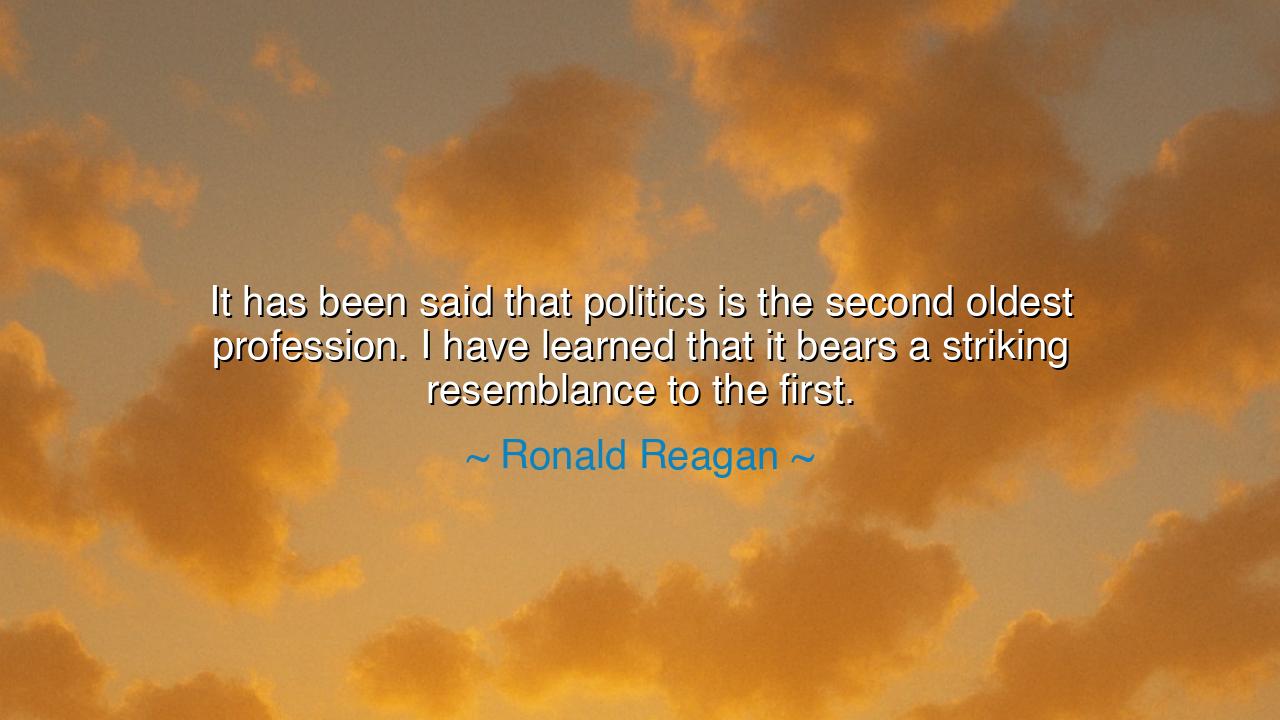
It has been said that politics is the second oldest profession.
It has been said that politics is the second oldest profession. I have learned that it bears a striking resemblance to the first.






The words of Ronald Reagan, “It has been said that politics is the second oldest profession. I have learned that it bears a striking resemblance to the first,” are both jest and judgment. With wit sharpened by experience, Reagan compares the world of politics to prostitution, implying that many who claim to serve the public are, in truth, selling themselves—trading principles for power, favors for influence, and honor for gain. His words reveal the cynicism born of watching men in high office barter away truth as though it were coin.
In the ancient spirit, this observation echoes the warnings of philosophers who long distrusted rulers. For was it not Plato who feared that leaders, corrupted by desire, would serve not the people but themselves? The comparison to the “oldest profession” cuts deep, for it suggests that politics, like flesh for sale, often becomes a marketplace where loyalty, justice, and virtue are commodities to be purchased by the highest bidder.
Consider the history of the Roman Senate. In its early days, it was a council of honor, where men debated the good of the Republic. Yet as time passed, senators were bought with bribes, and elections were steeped in corruption. The noble office was degraded into a trade, much as Reagan describes—a resemblance to the “first profession,” where the body is sold. In Rome’s case, it was the soul of the Republic that was bartered away, until empire replaced freedom.
Reagan’s words also remind us of the danger of disillusionment. For when people believe that politics is nothing more than corruption, they turn away in disgust, leaving the field open to the very profiteers they despise. His jest is a warning: that unless citizens demand integrity, the resemblance he points to will grow ever sharper. The public must guard its leaders as one guards a treasury, for unchecked, they may sell what belongs to the people—their trust, their freedom, their future.
So let this teaching endure: politics must not become the trade of the soul. Though temptation surrounds it, though corruption lurks in its halls, leadership must be reclaimed as service, not sale. Reagan’s quip, though wrapped in humor, calls for vigilance and virtue. Let future generations remember: when rulers treat politics as a bargain of self-interest, the people suffer; but when they treat it as a sacred trust, the nation thrives.






DLTran Duc Loc
This quote definitely makes you think twice about politics. The comparison to the oldest profession isn't flattering, but it feels accurate in some respects—politicians often have to make difficult choices that can look morally questionable. What would a world look like where these choices weren’t seen as necessary? Could the political system ever evolve into something that isn't driven by such compromises?
VPvinh phu3969
I’ve always liked how Reagan uses humor to make a sharp point about politics. But I wonder: does this comparison help us understand the darker side of politics or does it just dismiss the hard work that many politicians do? It’s easy to be cynical, but what would a truly selfless politician look like, and could we trust them in today’s system?
PLPhuc Le
This quote sounds a little cynical but maybe it’s more realistic than we’d like to admit. Are we too harsh on politicians when we view them this way? Is it true that the line between serving the people and self-serving interests is often blurred? Maybe the question we should ask is how we can push for more accountability and transparency in politics.
LLan
What do we think about the comparison between politics and the oldest profession? Some might say it’s a clever quip, but it raises a serious question about the integrity of politicians. Could it be that Reagan is critiquing a system where those in power might exploit their position for personal gain? What kind of reform, if any, can actually fix this?
DDnghi dung dao
Reagan's quote humorously suggests that politics is as old as the world's oldest profession, but there's a dark implication here about the nature of politics. Is he arguing that politics is driven by self-interest and manipulation? If so, is this really an accurate description of the political process, or is it an unfair comparison to those in other professions who face similar ethical challenges?